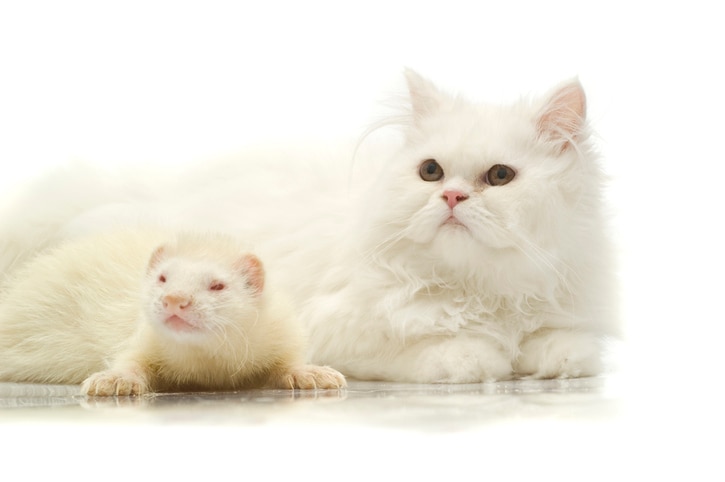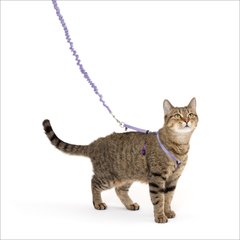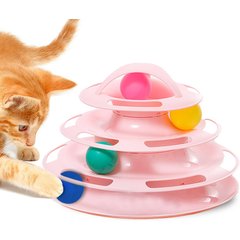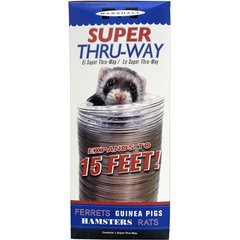Do Ferrets and Cats Get Along?

Photo by 101cats / iStock / Getty Images Plus
If you’re considering adding a ferret to your cat-friendly home, you’re probably curious about whether ferrets and cats can coexist. The answer can depend on several things, especially the personalities of the pets involved.
With the help of our experts, we asked the important question: Do cats and ferrets get along? Here’s what you need to know.
Do Ferrets and Cats Get Along?
The relationship between ferrets and cats can vary greatly. While some cats and ferrets become playful friends, others might have conflict, which can lead to dangerous situations.
The animals’ personalities and past experiences will have a lot of say in how coexisting will go.
“Some cats are just innately curious and playful, and it might work out very well when coupled with an equally havoc-wreaking and mischievous ferret,” says Clara Whitmore, DVM, the in-house veterinarian at Boxie.
It’s also important to remember that both cats and ferrets are predators. While this can help avoid problems seen with cats being kept with smaller animals like gerbils or hamsters, it can sometimes create tension.
“Some ferrets delight in ‘hunting’ and taunting cats, which is something that some cats tolerate while others find threatening,” says Sandra Mitchell, DVM, DABVP, a veterinarian and owner of All Creatures Veterinary Services in Eddington, Maine. “I have had them live together peaceably in my own house, but it is a tread lightly situation.”
How To Introduce Ferrets and Cats
Introducing a ferret and a cat should be done gradually and with plenty of supervision.
Start slowly by letting the animals get used to each other’s scent first, without direct contact, to prevent either pet from getting stressed or afraid.
“One bad interaction may sour everything that follows,” Dr. Whitmore says.
Here are some tips for introducing your cat and ferret:
- Start with scent swapping (using bedding or toys) without direct contact.
- Use a barrier (like a pet gate) to let them meet each other safely.
- Gradually progress to direct introductions when both pets are calm.
- Keep both animals on leashes so you can quickly separate them should a problem arise.
- Always supervise closely and watch for any signs of aggression or distress.
Dr. Mitchell says that attacks can be “very sudden and come without any warning” from either animal, and “injuries can happen quickly.” It’s better to be cautious and never leave your pets alone together.
Recommended Products
What To Do If Your Cat and Ferret Don’t Get Along
If your cat and ferret don’t hit it off, it’s important to prioritize safety.
Dr. Whitmore recommends giving each pet their own space where they can eat, sleep, and play without fighting over territory, with baby gates or playpens in place to prevent further issues. Ensure that the baby gate you choose has small openings so your ferret cannot slip right through. Ones made with wire or fabric mesh would be best.
If they’re aggressive or always tense each other, stop trying to force a friendship, she adds. It’s better to focus on enriching their individual spaces with plenty of toys and stimulation to keep them from getting bored.
“Some pet parents have had success with alternating playtimes or scent swapping, but sometimes it’s going to be beyond that, and complete separation is the safest option,” Dr. Whitmore says.
Recommended Products
Safety Tips for a Cat-Ferret Household
While most cat-ferret households do just fine with supervised time together and having areas for each pet to retreat to alone, it’s always better to play it safe.
Keeping the following tips in mind can help you find peace in your multi-pet home:
- Never leave them alone together, unsupervised, no matter how much they seem to get along. “A very whimsical nip might be all it takes to cause serious injury,” Dr. Whitmore says.
- Watch for signs of aggression, such as hissing, puffing up, or swiping from your cat, or intently biting or lunging from your ferret.
- Keep each pet’s food and toys separate from the other pet.
- Ferrets love sneaking into small spaces, so ferret-proofing your home is highly recommended.
When in doubt, exercise caution!
“Both animals are predators,” Dr. Mitchell adds. “If at any point in time they see each other as prey, the results can be devastating.”
External Sources







